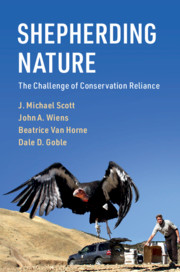Book contents
- Shepherding Nature
- Shepherding Nature
- Copyright page
- Contents
- Preface
- Acknowledgments
- 1 Extinction and the Challenge of Conservation Reliance
- 2 The Conservation Spectrum
- 3 The Genesis of Conservation Reliance and the Language of Conservation
- 4 What Are the Threats?
- 5 Emerging Threats in a Rapidly Changing World
- 6 The Role of Policy and Law
- 7 What’s in the Conservationist’s Toolbox: Species-Centered Approaches
- 8 Expanding the Conservationist’s Toolbox: Going Beyond Species
- 9 Conservation Reliance Is a Human Issue
- 10 Making Tough Decisions: Prioritizing Species for Conservation
- 11 Being a Good Shepherd
- Book part
- Essay Contributors
- References
- Index
9 - Conservation Reliance Is a Human Issue
Published online by Cambridge University Press: 28 February 2020
- Shepherding Nature
- Shepherding Nature
- Copyright page
- Contents
- Preface
- Acknowledgments
- 1 Extinction and the Challenge of Conservation Reliance
- 2 The Conservation Spectrum
- 3 The Genesis of Conservation Reliance and the Language of Conservation
- 4 What Are the Threats?
- 5 Emerging Threats in a Rapidly Changing World
- 6 The Role of Policy and Law
- 7 What’s in the Conservationist’s Toolbox: Species-Centered Approaches
- 8 Expanding the Conservationist’s Toolbox: Going Beyond Species
- 9 Conservation Reliance Is a Human Issue
- 10 Making Tough Decisions: Prioritizing Species for Conservation
- 11 Being a Good Shepherd
- Book part
- Essay Contributors
- References
- Index
Summary
Successful conservation depends on human attitudes, values, and support. Increasingly scientists and managers analyse not only species status and needs, but also the long-term cost, risk, and effectiveness of activities. Socioeconomic costs and benefits are integral to these analyses. Gorongosa National Park in Mozambique provides a case study of conservation integrated with local community needs. Endangered Delta smelt in California exemplify conflicts around water apportionment. Case studies demonstrating the importance of socioeconomic considerations are provided by management of gray wolves and grizzly bears in the United States. The story of sage grouse illustrates how a regional agreement that resulted from many years of collaboration among stakeholders can be nullified by political changes at the national level. The cultural and socioeconomic values and rights of indigenous people play a prominent role in salmon management that can run counter to the interests of hydroelectric companies and other water users. Case studies illustrate how habitat management can be facilitated by participation by non-governmental organizations. Socioeconomic and political consideration also underlie the question of who can take responsibility for managing conservation-reliant species.
Keywords
- Type
- Chapter
- Information
- Shepherding NatureThe Challenge of Conservation Reliance, pp. 258 - 290Publisher: Cambridge University PressPrint publication year: 2020

